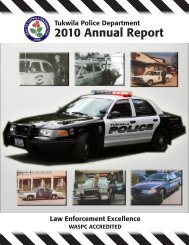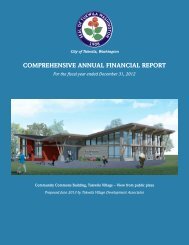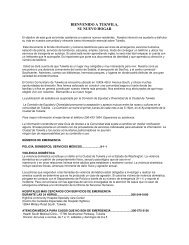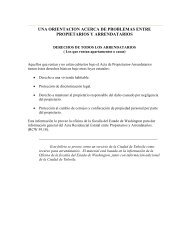2013â2014 BIENNIAL BUDGET - the City of Tukwila
2013â2014 BIENNIAL BUDGET - the City of Tukwila
2013â2014 BIENNIAL BUDGET - the City of Tukwila
- No tags were found...
You also want an ePaper? Increase the reach of your titles
YUMPU automatically turns print PDFs into web optimized ePapers that Google loves.
2013-2014 Biennial Budget <strong>City</strong> <strong>of</strong> <strong>Tukwila</strong>, WashingtonCapital BudgetThe capital budget authorizes and provides <strong>the</strong> basis <strong>of</strong> control <strong>of</strong> expenditures for <strong>the</strong> acquisition <strong>of</strong>significant city assets and construction <strong>of</strong> capital facilities.Separation <strong>of</strong> <strong>the</strong> budget into <strong>the</strong>se two components separates key policy issues in order to facilitate <strong>the</strong>irconsideration. The policy <strong>of</strong>ficials can examine <strong>the</strong> level at which existing programs should be funded,what program improvements should be made and at what level <strong>of</strong> funding.Capital PlanningThe Capital Improvement Program (CIP) was originally adopted as an element <strong>of</strong> <strong>the</strong> <strong>City</strong>Comprehensive Plan that provides <strong>the</strong> <strong>City</strong>’s plans to finance capital facilities that will be needed during<strong>the</strong> next 20 years. The CIP includes both long-range strategy and a specific six-year plan <strong>of</strong> projects. TheCIP is maintained and reports are published separately from <strong>the</strong> budget. The Capital Budget, in thisbudget document, includes a summary <strong>of</strong> <strong>the</strong> projects and <strong>the</strong>ir appropriations for <strong>the</strong> upcomingbiennium. For more detailed information see <strong>the</strong> Financial Planning Model and Capital ImprovementProgram.Implementation, Monitoring and AmendmentThe financial aspects <strong>of</strong> <strong>the</strong> budget are monitored in periodic reports issued by <strong>the</strong> Finance Departmentcomparing actual expenditures and revenues with <strong>the</strong> budget. In <strong>the</strong>se reports, financial data can bepresented at a higher level <strong>of</strong> detail than <strong>the</strong> final budget. These reports include an analysis <strong>of</strong> <strong>the</strong> <strong>City</strong>’sfinancial condition.From time to time it becomes necessary to modify <strong>the</strong> adopted budget. The procedure for amending <strong>the</strong>budget depends upon <strong>the</strong> type <strong>of</strong> change that is needed. One type <strong>of</strong> change does not affect <strong>the</strong> “bottomline” total for a department or a fund. These changes, mainly transfers from one line-item to ano<strong>the</strong>rwithin a department’s operating budget or changes between divisions within a department is presentedby administration to <strong>City</strong> Council for <strong>the</strong>ir consideration and approval.The second type <strong>of</strong> budget amendment brings about a change in <strong>the</strong> total appropriation for a departmentor fund. Examples <strong>of</strong> <strong>the</strong>se changes include but are not limited to <strong>the</strong> following: <strong>the</strong> acceptance <strong>of</strong>additional grant money, an adjustment to reflect increased revenues such as tax receipts, <strong>the</strong>appropriation <strong>of</strong> additional funding if expenditures are projected to exceed budgeted amounts, and reappropriation<strong>of</strong> monies from one fund to ano<strong>the</strong>r when deemed necessary. These changes requirecouncil approval in <strong>the</strong> form <strong>of</strong> an ordinance. The status <strong>of</strong> <strong>the</strong> budget is comprehensively analyzedduring <strong>the</strong> mid-biennial review and periodically through each year to identify any needed adjustments.All requests for amendments are first filed with <strong>the</strong> Finance Department.Basis <strong>of</strong> BudgetingAll governmental fund type budgets are prepared on <strong>the</strong> modified accrual basis <strong>of</strong> accounting inconformity with generally accepted accounting principles (GAAP). The budget for proprietary funds isprepared on an accrual basis, also in accordance with GAAP. The legal level <strong>of</strong> budgetary control whereexpenditures cannot exceed appropriations is at <strong>the</strong> individual fund level. Revisions that alter <strong>the</strong> totalexpenditures <strong>of</strong> any fund must be approved by <strong>the</strong> <strong>City</strong> Council and adopted by ordinance.Chapter 35.33 <strong>of</strong> <strong>the</strong> Revised Code <strong>of</strong> Washington (RCW) mandates <strong>the</strong> <strong>City</strong>’s budget procedures. Thebudget, as adopted biennially by <strong>the</strong> <strong>City</strong> Council, constitutes <strong>the</strong> legal authority for expenditures. The<strong>City</strong>’s budget is adopted at <strong>the</strong> fund level and expenditures may not legally exceed appropriations atthat level <strong>of</strong> detail.Page 35
















